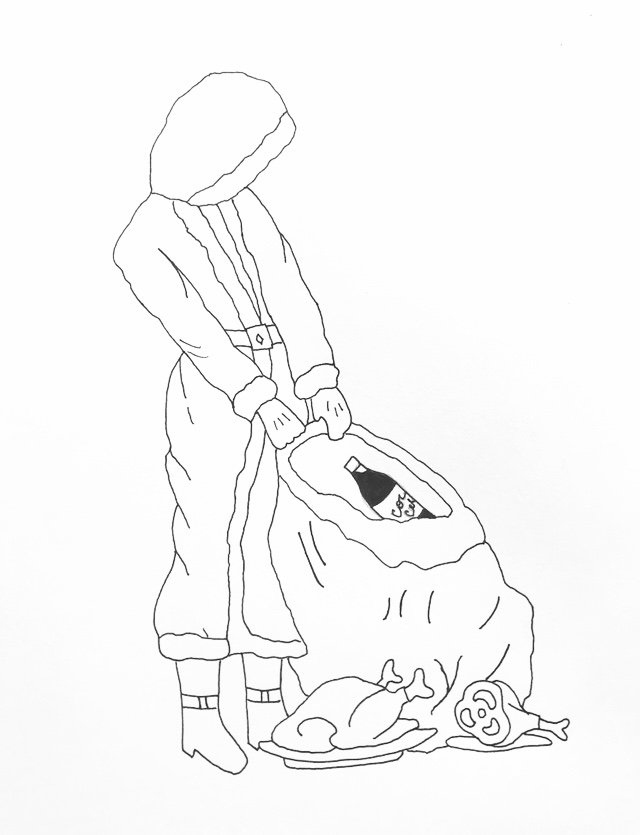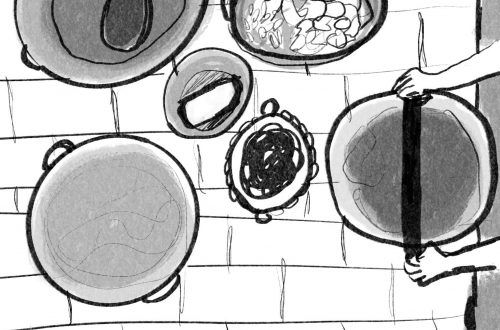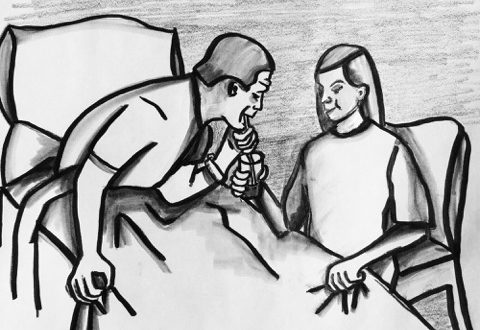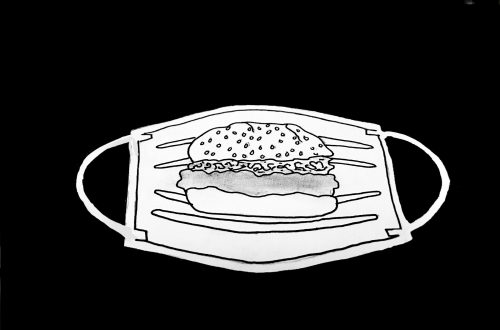by Ed Southern
Art by Corrine Pease
Ed’s essay, “Nanny’s Crowded Christmas Counter,” appears in Episode 8 of the Dirty Spoon Radio Hour, which aired on December 7, 2018.
My mother was born on Christmas Eve, so that was always her day, claimed by and spent with her parents down in Lincoln County, North Carolina, ninety country-mile minutes from our home in Winston-Salem.
That suited just fine my other grandmother, my father’s mother, because that meant she got to lay claim to Christmas Day itself. She’d never turn down the bigger stage.
Widowed before she was a grandmother, she lived several places I can recall, but the house I think of when I think of ‘her house’ was only fifteen minutes from the house I think of when I think of ours. Her grandchildren called her Nanny, which got confusing when her mother and sisters were with us, because all their grandchildren called them Nanny, too.
Our Nanny spoiled us rotten, flattered and cajoled us even as children, and hoarded the holiday cooking the way she hoarded cigarette lighters, Coca-Colas, and candies, the way she tried to hoard our affection.
—
Before her first Christmas in the family, my mother asked what she could bring to dinner. “Nothing,” her new mother-in-law said, with a smile, with sugar spilling from her voice, for yes, of course she was one of those Southern women who believe you can say anything and get away with it, if you say it sweetly and smiling.
Not wanting to seem rude, ill-bred, or lazy, my mother brought a simple casserole, anyway.
“Oh. Here, let me take that,” her mother-in-law said, without a smile, without a pinch of sugar, and sat the dish off by itself, to the side of the counter she used as serving line. None of my mother’s new relations touched it. They knew better.
—
So Nanny kept all the cooking to herself, and she cooked by herself for days, and she cooked on her own everything she thought a one of us might like, with one exception. She baked ham, roasted turkey, and fried chicken. She cooked collard greens, green beans, pinto beans, mashed potatoes, yam soufflé, baked macaroni and cheese. She fixed corn bread from scratch in a cast-iron skillet, then bought and heated Sunbeam Brown ‘N Serve rolls. For dessert, she almost always made a pound cake, a chocolate layer cake, and either a chess or pecan pie, sometimes both, and set a tub of Cool Whip to their side.
Then, to be safe, to make as sure as she could that none of hers would leave her house with a hankering unmet, she’d make the one exception, allow the one food into her kitchen that she hadn’t cooked herself. The last day before they closed for Christmas, she’d run over to Pulliam’s on Old Walkertown Road, and buy a pint of barbecue, chopped and Lexington-style. She’d keep it in her bursting refrigerator until just before we came, then warm it on the stove so that the dip was bubbling by dinner time.
No one believes me now—not even my parents, and they were there—but for years, until well into high school, I would not eat barbecue. I avoided most vegetables, too. I didn’t, couldn’t, explain it then, but my pickiness had less to do with taste or texture than with . . . well, I’m not sure aesthetics is the right word, but it’s close.
I didn’t trust them. I didn’t trust anything that bubbled and might spread across my plate. I wanted, maybe even needed, food with fixed borders, limits, spatial confinements. Like animals, like some of the boys at school, anything that could move across lines but not reason would hurt me, I just knew.
I didn’t trust anything that bubbled and might spread across my plate.
By the time I tried, and in time came to love, the barbecue, the green beans and pintos, the collards, I was practically grown, and we hadn’t lived for years in our hometown, in Nanny’s town, and I was nearly drowning for lack of feeling at home.
—
Nanny blamed the Great Depression for her overcrowded Christmas counter. She’d talk about the hardships, the deprivations, and say, “I swore that when I had my own house and family, I’d never be without a Co-Cola, and enough food for everybody.”
By the age I was eating the barbecue, I was questioning Nanny’s story, too. I knew, and know, her family never had much. Her father was below her mother’s station, and never found the approval of her people, so after the First World War they left their north Georgia cotton farm and came to North Carolina looking for work. They found it in cooking. Nanny’s father ran the diner at the Greyhound bus depot. Nanny’s mother baked cakes and other desserts for Roland Bennett’s, a downtown lunch counter that was a local institution until it closed in the 1980s. They managed to buy a house roomy enough to take in boarders, and Nanny and her sister learned to cook by helping cook those big, communal meals. By the 1950s, my great-grandparents were able to open their own restaurant, the Twin City Café, down on Trade Street near the R. J. Reynolds cigarette factories, where all the region’s farmers brought their tobacco to market every fall.
(My father started waiting tables there while still a young boy, and his stories of it are reminders that the ‘50s weren’t as wholesome as we like to think, and the things we associate with the Old West aren’t always all that old or all that west, and are worthy of their own telling someday.)
So while the household Nanny grew up in couldn’t have afforded many luxuries, they also couldn’t have been quite as deprived as Nanny later claimed. They must have had some lean months, and maybe years—when first they left north Georgia, when first they came to Winston-Salem—but they couldn’t have wanted much for food, sweet or savory, at least not for long.
By the time I was grown, living on my own and living in Winston-Salem again, I had figured out what should have been clear even to an adoring child. Nanny didn’t overload her Christmas counter because of the Depression, but because of what we now know was her depression, that hungry, lonely, heirloom hurt she inherited, and passed along.
She cooked like a demon to keep her demons at bay. She cooked for days because she knew she could give us this, and no one would turn it down or take it away. She cooked to fight off her fears—that we would leave her lonesome, and forget about her; that we would not love her best; that we would not love her at all.
—
That such food as she fixed us for Christmas is the subject of rich and scholarly study would likely confuse and bemuse her. She was most proud of her cooking, of course, but to her what she cooked was just food, just sustenance, not folk art or edible history. Whatever meaning each recipe and its execution conveyed—the subtle shades of class and plenty, of who your people were and where you came from, the tooth-and-claw competition between good Christian ladies—they simply were, and were taken for granted, like the weather or taxes, like churchgoing or segregation.
She was most proud of her cooking, of course, but to her what she cooked was just food, just sustenance, not folk art or edible history.
That I could tell her now about the cultural history of each dish laid out on her counter, the economics and intersectionality and cross-pollination, would delight and impress her, but only because I—first-born son of her first-born son—was doing the telling, had read such hefty books to get such notions, had been to college and learned to use such big words to talk about yams and collards and barbecue.
We never once called it “’cue,” by the way.
We’d have looked sideways at anyone who did, wondering who they were trying to fool. We never stretched to seem down-home. We just were what we were, and if that was down-home, we actually were doing our best to get shy of it. We all, in our ways, were doing our best to get above our raisings, even those who’d done the raising.
Nanny could tell us, in living detail, how to wring a chicken’s neck and pluck it, for that had been one of her chores in the backyard of the boarding house. Yet she told it with such bitter disdain, and a mix of relief and resentment that we’d never had to do the same. She’d always made her three children call her “Mother”: she’d ignore them, even when they were small, if they called her Mama or Mom or any other such diminutive. Somewhere between the Georgia cotton fields and her overcrowded Christmas counter, her people had become city folk, with all the nuance and contradiction that comes in and with the urban south. Nanny’s family may have had to take in boarders, but they were not boarders themselves. They may have had to work before sunup to long after sundown, but for much of their lives they worked for themselves, not for a wage, not on a line. Even before they’d left the cotton farm, they’d known themselves, for the farm had been their own. They’d left it because they aspired for more.
Somewhere between the Georgia cotton fields and her overcrowded Christmas counter, her people had become city folk, with all the nuance and contradiction that comes in and with the urban south.
—
So she understood when we left Winston-Salem, one after another, taking promotions, starting businesses, find a place or moving up in this world: her youngest son off to Raleigh, then to Charlotte; a niece and her kids gone to Texas; then her oldest son and his family—us—to South Carolina, halfway back to north Georgia. She didn’t like it, not one bit, but she understood.
However far away we were, we still came to Nanny’s every Christmas Day, all of us and our families together, even after her grandchildren were grown and had families of our own. Her house became as overcrowded with great-grandchildren as her counter was with food.
She still did all the cooking, all by herself, and really all of it now, for she stopped going to Pulliam’s for barbecue as driving became more worrisome for her. Until her 80s, until the Alzheimer’s began to take her, she spent days filling her kitchen for us: ham and turkey and chicken, green beans and collard greens, yams and mashed potatoes, her much-loved baked macaroni and cheese that no one else could get quite right (another story for another telling), corn bread and Brown ‘N Serve rolls, cakes and pies, two-liter bottles of Coke and three pitchers of sweet tea.
She cooked not a bit of it as a beacon of home, or of down-home, of how life used to be, of where we came from and better not forget, of good ol’ days, for she knew these days were as good or better.
She certainly didn’t cook these particular foods so that we could someday prove our bona fides to academics and bearded hipsters, so that we could lay a claim to cultural studies, so that I could tell all this on her to y’all. She cooked those foods because those were what she knew how to cook and cook better than most; because those foods, to her, were food, were what families ate when they got together on Christmas.
She cooked not a bit of it as a beacon of home, or of down-home, of how life used to be, of where we came from and better not forget, of good ol’ days, for she knew these days were as good or better.
Even if all our accents did get a little thicker in Nanny’s kitchen than in our schools and Sun Belt suburbs, we knew she wasn’t cooking to make us remember our history. She was cooking to make us remember her, as if we could ever forget. She was cooking to make us full, and happy.
Custom artwork by Corinne Pease

Ed Southern is the executive director of the North Carolina Writers’ Network, one of the largest regional literary organizations in the country. Before that he worked in publishing and in bookselling, managed a coffee shop, sold sporting goods, cleaned bathrooms, helped run facilities at a major art museum, covered high school football and basketball for the local newspaper, tended bar, drove a delivery truck, bussed tables, ran the scoreboard for church-league basketball games, bagged groceries, and mowed yards.
His fiction, nonfiction, and plays have appeared in the North Carolina Literary Review, storySouth, the NC 10×10 Festival, Change Seven, the Asheville Poetry Review, South Writ Large, the Raleigh News & Observer, and more. He also is the author of four books, including the short-story collection Parlous Angels. In 2015, he received the Fortner Award for service to North Carolina arts & culture. He lives in Winston-Salem.
Author photo by Jorge Cortese.






